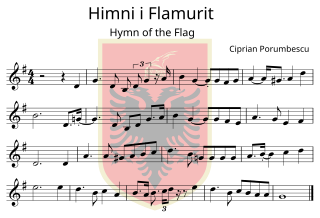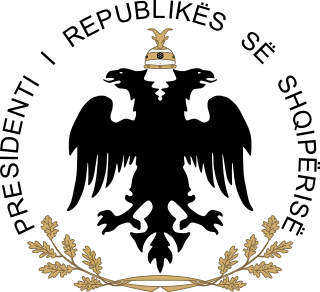Albania is a unitary parliamentary constitutional republic, in which the president of Albania is the head of state and the prime minister of Albania is the head of government in a multi-party system. The executive power is exercised by the Government and the prime minister with its Cabinet. Legislative power is vested in the Parliament of Albania. The judiciary is independent of the executive and the legislature. The political system of Albania is laid out in the 1998 constitution. The Parliament adopted the current constitution on 28 November 1998. Historically Albania has had many constitutions. Initially constituted as a monarchy in 1913, Albania became briefly a republic in 1925, and then a authoritarian monarchy in 1928. In 1939 Albania was invaded by Fascist Italian forces, imposing a puppet state, and later occupied by Nazi German forces. Following the partisan liberation from the Nazis in 1944 a provisional government was formed, which by 1946 had transformed into a communist one-party state. In March 1991 democracy was restored with multi-party elections.

"Himni i Flamurit" is the national anthem of Albania, adopted in 1912. Its music is derived from the Romanian patriotic song "Pe-al nostru steag e scris Unire", composed by Ciprian Porumbescu. The lyrics, which are close to the original Romanian lyrics, were written by Albanian poet Asdreni. The anthem was originally titled "Betimi mbi Flamur".

The president of Albania, officially styled the President of the Republic of Albania, is the head of state, commander-in-chief of the military and the representative of the unity of the Albanian people.

The coat of arms of Albania is an adaptation of the flag of Albania and is based on the symbols of Gjergj Kastrioti Skanderbeg. It features the black double-headed eagle, documented in official use since 1458, as evidenced from a sealed document uncovered in the Vatican Secret Archive, addressed to Pope Pius II and co-sealed by notary Johannes Borcius de Grillis. The stylized gold helmet is partially based on the model of crown-like rank that once belonged to Skanderbeg, currently on display at the Kunsthistorisches Museum in Vienna, first mentioned in 1593 in the Ambras armory inventory and depicted in 1601/03 in the "Armamentarium Heroicum" of Jakob Schrenck von Notzing. The ruler of Austria, Ferdinand II, acquired the helmet from the Duke of Urbino, so mentioned in a letter sent to him from the duke, dated 15 October 1578.

The Parliament of Albania or Kuvendi is the unicameral representative body of the citizens of the Republic of Albania; it is Albania's legislature. The Parliament is composed of no less than 140 members elected to a four-year term on the basis of direct, universal, periodic and equal suffrage by secret ballot. The Parliament is presided over by the Speaker, who is assisted by at least one deputy speaker. The electoral system is based on party-list proportional representation. There are 12 multi-seat constituencies, corresponding to the country's counties.

Bulqizë is a municipality in Dibër County, northeastern Albania. The municipality consists of the administrative units of Fushë-Bulqizë, Gjoricë, Martanesh, Ostren, Shupenzë, Trebisht, Zerqan with Bulqizë constituting its seat. As of the Institute of Statistics estimate from the 2011 census, there were 8,177 people residing in Bulqizë and 32,210 in Bulqizë Municipality.

Orders, decorations and medals of Albania are state decorations regulated and bestowed by the Republic of Albania.

The Supreme Court of the Republic of Albania is the highest court of Albania and is the final court of appeals in the country's judicial system. It is composed of seventeen judges: the Chief Justice and sixteen Members.

The Republican Guard is a militarized government agency of Albania mandated by law to protect high-ranking state officials, including the President of Albania, as well as certain national properties, high-ranking foreign visitors and diplomatic offices. It is mostly subordinate to the Ministry of Internal Affairs, except that the unit responsible for the president's security being under the authority of the president.
The national symbols of Albania are symbols that are used in Albania to represent what is unique about the nation, reflecting different aspects of its culture and history. The symbols may also be used in the Kosovo, North Macedonia, Montenegro, Greece (Chameria), Serbia and by the Arbëreshë in Italy.
The law of Romania is civil law.

The "Honour of the Nation" Decoration is the highest decoration to be given in Albania, among the Civil awards and decorations of Albania, and was instituted by special law No. 8113, of 28 March 1996, entitled Për dekoratat në Republikën e Shqipërisë, later amended by law No. 112/2013 Për dekoratat, titujt e nderit, medaljet dhe titujt vendorë të nderit në Republikën e Shqipërisë.

The Authority for Information on Former State Security Documents is a public, independent, legal entity in the Republic of Albania, responsible for the collection, administration, processing and use of former State Security documents and any information related to them. The authority is headquartered in Tirana and is financed primarily by the state budget and other legal sources.
The second Government of Prime Minister Edi Rama was the 66th ruling Government of the Republic of Albania which was officially mandated by the President on 13 September 2017. Following the 2017 election, the Socialist Party won a majority of seats to Parliament and had the right to form the government without the need of a coalition.

The Buna River-Velipojë Protected Landscape is a protected landscape area in northwestern Albania, encompassing the estuary of Drin, the lagoon of Viluni, the river of Buna with its estuary, and the gulf of Drin that runs across the city of Velipojë alongside the Adriatic Sea.
The law of Bolivia includes a constitution and a number of codes.
The law of Hungary is civil law. It was first codified during the socialist period.

The first Government of Prime Minister Sali Berisha was the 63rd ruling Government of the Republic of Albania formed on 8 September 2005. Following the 3 July 2005 election, the Democratic Party formed a center-right post-electoral alliance to make a majority of seats to Parliament and form the government. The alliance consisted of five-center-right parties led by Sali Berisha managed to create a majority of 81 deputies out of 140 in the Assembly. The new government led by Sali Berisha was voted on 8 September with 84-votes Pro, and took oath on 11 September in the presence of the President of the Republic Alfred Moisiu.

Fletorja Zyrtare is the official government journal of the Republic of Albania. Published in a bulletin format, the journal is under the editorial oversight of the Official Publishing Center which is the only institution in the country authorized for its publication. It contains all administrative and legal acts of the state pursuant to articles 78 and 83 of the constitution.













